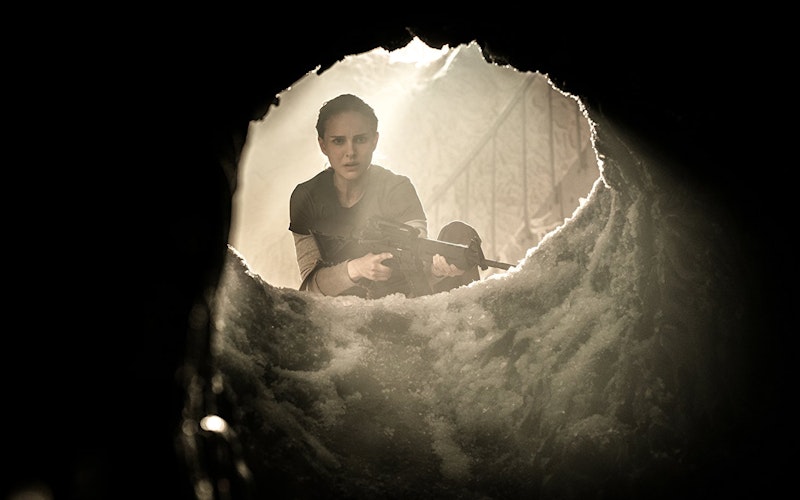
Movies
Escaping Annihilation
Early in Annihilation, Lena (Natalie Portman), a biology professor, describes cells to her students as the building blocks of all life. Cells are born of other cells, she explains, growing, splitting, and eventually forming into plants, animals, humans—every living thing. They are also, however, the engineers of destruction. As the students watch footage of dividing cells, Lena tells them that what they’re seeing is a cancerous tumor.
We all live knowing that our time on Earth is finite. Whether it’s a sudden accident, illness, or old age, we all die. In the church, we kick off the season of Lent with Ash Wednesday, a liturgical reminder that our imperfections don’t only encompass the sinfulness of human nature, but are literally coded into our very bodies. We are dust, and to dust we will return. This is a concept that Annihilation, with its evocation of mortality and decay, eerily echoes.
Fair warning: spoilers are ahead. Annihilation begins with the interrogation of Lena, the only survivor of a scientific expedition to a place called The Shimmer, a stretch of swampland surrounded by a strange veil of light. We learn Lena joined the team after her husband Kane (Oscar Isaac) returned, barely alive, from an earlier mission there. In an effort to learn what happened, Lena enters The Shimmer alongside expedition leader Dr. Ventress (Jennifer Jason Leigh) and team members Anya (Gina Rodriguez), Sheppard (Tuva Novotny), and Josie (Tessa Thompson).
What Lena and her colleagues discover is a land in the midst of grotesque and beautiful mutation. A single overgrown vine sprouts several different species of plants. An alligator’s mouth displays rows of shark’s teeth. It’s a place of both brilliant new creation and terror, as the team starts to realize The Shimmer is changing—and destroying—their own bodies as well.
We all live knowing that our time on Earth is finite.
The film’s most consistent metaphor is of chronic disease. The expanding nature of The Shimmer itself resembles the growth of a tumor. The mutations inside it are also tumor-like, with some startling growths having absorbed and broken down the bodies of previous explorers. Cancer impacts the lives of the characters even before they enter The Shimmer, as it’s revealed that Ventress suffers from the disease and Sheppard lost her daughter to leukemia.
The ways the characters confront their individual fates within The Shimmer also reflect the ways we address our own inevitable ends—whether it’s through fear, acceptance, fighting, or pragmatism. After Sheppard is killed by a wild animal, the creature shows up in a later scene, with growls that sound like her screams, an imprint of her fear-filled final moments. Ventress is determined to finish out the mission before The Shimmer changes her into someone or something unrecognizable, which is already her fate as someone dying of cancer. Lena, ever the scientist, seeks to understand what she’s experiencing, and through explaining it, fix the problem.
All of these reactions come from an understandable desire to control, understand, and prevent the inevitable. Our fear of death isn’t only about uncertainty over what’s on the other side, but also knowing that we can’t control what’s happening to our bodies. As people of faith, however, we learn to regard death as a transformation of states, a transition from the fallenness of this world to the restoration in the new heaven and the new earth, where there is "no more death or mourning or crying or pain." In Annihilation, we see a hint of this through the character of Josie. When she realizes she’s being assimilated into The Shimmer, Josie expresses no desire to fight or find answers, but accepts it as a natural change. She doesn’t die, but rather transforms, quietly and beautifully, into a human-shaped cluster of flowering vines.
Writer-director Alex Garland (Ex Machina) has said that ideas of mortality and self-destruction are key to the movie, yet Annihilation ultimately is more interested in questions than answers. The film explores the ways that we self-destruct, both scientifically and psychologically, but not what those patterns say about the world we live in. The film’s ambiguous ending certainly offers no kind of concrete conclusion. However, Annihilation’s lack of answers opens the door for further discussion about our own inherent brokenness.
The story of the Bible is of man’s continual bent towards self-destruction through sin. The gospel both humbles us, by reminding us how far we’ve fallen into self-destructive patterns, and gives us hope in the knowledge that God loves us in spite of those tendencies. Annihilation reminds us that we live in a diseased world, where nobody gets out alive. Scripture reminds us that the disease and destruction of our world exists because it’s fundamentally flawed, and can only be fixed through the promise of salvation. Yes, we all die. But we can choose to react to the knowledge of our mortality with grace and acceptance, because we know that even in our brokenness, there is the possibility for healing.
Topics: Movies